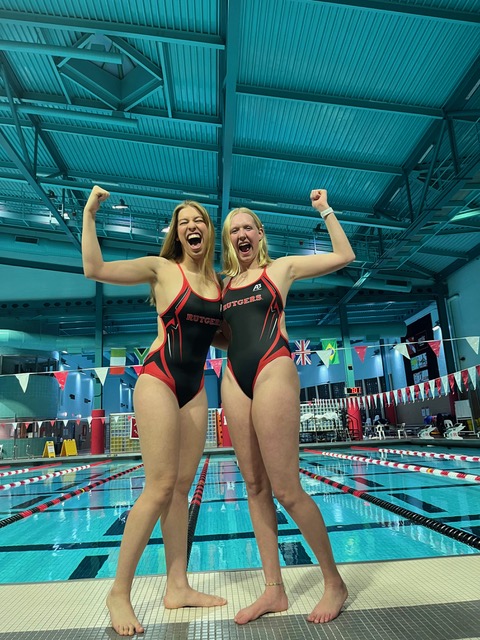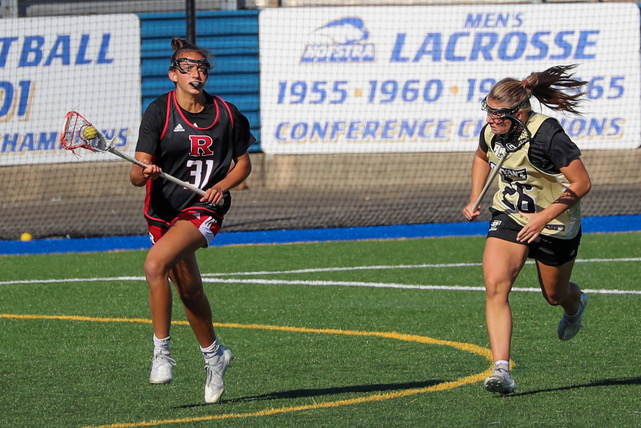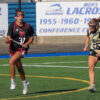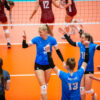The NCAA’s turnaround on name, image and likeness rules has instigated an explosion of emvironmental activism
Rutgers University, recognised as the eighth oldest institution of higher learning in the United States, boasts a storied legacy of academic excellence. While the New Brunswick, New Jersey school is known as ‘The Birthplace of College Football’ – hosting and winning the sport’s first ever game in 1869 – its athletics history since then has mostly been mired in mediocrity, grappling with the perennial challenge of competing against larger, more resource-rich counterparts.
While the university has made strides in recent decades, most notably by joining the powerhouse Big Ten conference, resulting in increased success in some sports and greater donor support for its athletics program, it remains situated in the middle to lower echelons of the competitive hierarchy, highlighting the stark disparities.
However, on 30 June 30 2021, a watershed moment unfolded within the landscape of collegiate athletics. The National Collegiate Athletic Association (NCAA), the governing body overseeing student sports, orchestrated a groundbreaking shift in policy by reversing long-standing rules pertaining to name, image and likeness (NIL). This decision empowers student-athletes to capitalise on their personal brands, opening the doors for companies and organisations to enlist them as endorsers or celebrities, with potential deals spanning from modest figures to substantial sums in the hundreds of thousands of dollars.
For many, this long overdue reform was hailed as a beacon of progress, particularly for the multitude of elite athletes poised to transition into the professional realm, whether upon graduation or through alternative pathways.
Justice Brett Kavanaugh reflected this sentiment in a written statement during the landmark 2021 hearing: “Nowhere else in America can businesses get away with agreeing not to pay their workers a fair market rate on the theory that their product is defined by not paying their workers a fair market rate.
“Enormous sums of money flow to seemingly everyone except the student athletes. College presidents, athletic directors, coaches, conference commissioners, and NCAA executives take in six- and seven-figure salaries. Colleges build lavish new facilities. But the student athletes who generate the revenues, many of whom are African American and from lower-income backgrounds, end up with little or nothing.”
By October 2021, student-athlete ‘collectives’ to work with student-athletes and maximise their NIL opportunities began popping up in universities across the nation.
As former Rutgers basketball player Geo Baker was at the forefront of changing the legislation, Rutgers boosters were soon to follow by establishing its collective, Knights of the Raritan (KOTR), in May 2022.
All NIL contracts are sanctioned through the collective. KOTR also educates student-athletes on taxes, as endorsement deals are taxable events, and ensures that student-athletes fulfil their end of an obligation if they need to make a public appearance or promote a product.
Whereas money would flow towards major college sports like American football and basketball before the NIL changes, it’s now affecting every college sport. This also means that female athletes are finally being paid – some women’s basketball players even claim to be earning more through endorsement deals in college than they would in the WNBA.
But while NIL deals are usually commercial, the wave of NIL action has resulted in support being thrown behind student-athlete environmental activism. EcoAthletes, a US-based non-profit that inspires and coaches athletes to take climate action, partnered with KOTR to establish the first ever climate change-focused NIL program.
EcoAthletes founder and former Rutgers student Lew Blaustein argues that there’s no one better for organisations to use for endorsements than student-athletes: “[They] are held in extremely high esteem, are the most influential people on campus, and are willing,” he says. Moreover, small businesses with limited funds are finding that student-athletes are more cost effective than paying professional athletes or an entire university athletics department for endorsements, but often generate the same results.
The first five Rutgers student-athletes that EcoAthletes has activated behind the climate movement are Class of ’23 women’s gymnast Kaitlyn Bertola, junior 3,000-metre indoor track champion Alex Carlson, junior women’s lacrosse player Kelsey Klein, as well as junior women’s swimmers Halé Oal and Natalie Schick. All five are among the growing global group of EcoAthletes Champions that includes pros from MLB, NFL, NHL and WNBA, as well as five gold medallists from the Tokyo 2020 Olympics.

KOTR executive director Jon Newman was a fellow student of Blaustein’s at Rutgers. “I’ve always been a fan of what he’s been trying to do to bring athletics and sustainability together,” Newman says. “As the head of the collective, I saw an opportunity to marry that effort with the passion of student-athletes.”
After talking to athletes across campus, Newman discovered that many were passionate about the environment and willing to use their NIL to be more vocal in the climate conversation.
“It wasn’t really that difficult,” Newman adds. “When you think of the demographic, let’s say, 18- to 22-year-olds, this is a generation that is extremely concerned about the future. It’s an issue people are tuned into when they are affected personally.” This summer was no exception, with almost every region of the United States experiencing extreme heat.
Two Rutgers athletes and EcoAthletes Champions who turned towards environmental engagement from their personal experiences are Kelsey Klein and Halé Oal. Klein went on a pre-college trip to Alaska with Brown University, part of the Brown Environmental Leadership Labs, during a period where debates were occurring on whether to drill in the Arctic National Wildlife Refuge.
“Just looking at that issue in real time really sparked my interest in environmental policy,” says Klein. Entering college as a meteorology major, she quickly shifted towards an environmental policy institutions and behaviours major, minoring in environmental and business economics. “It really combines that one policy legislative side with how we can economically implement this,” she continues.
Oal intends to enter law school and specialise in environmental law. “I really got into conservation and activism with native populations throughout college,” she says, also expressing the desire to learn more about the environmental justice aspect of policy, “kind of more where Kelsey is leaning.”
Both have experienced a positive reaction on campus, with other students holding environmental interests approaching them to learn more about what they’re doing. Klein describes EcoAthletes as her “guide” on what information is important to disseminate on social media, podcast interviews and engaging others on campus in the climate conversation, while Oal enjoys EcoAthletes’ ‘community chats’, connecting EcoAthletes Champions around the world to “broaden our horizons on what we view climate change as.”
Over the next few months, Klein and Oal will be giving presentations about EcoAthletes and NIL opportunities to Rutgers’ Student-Athlete Advisory Committee, a body where student-athlete representatives from each sport convenes, as well as at local middle and high schools.
But on top of that, Klein and Oal participated in the inaugural EcoAthletes Collegiate Cup this year. The competition began in January and ended on Earth Day (22 April). Student-athletes competed against other universities by encouraging fellow student-athletes, family and friends to sign up to the Climategames app and convert their exercise to carbon reductions. This was achieved by using a wearable device, such as an Apple Watch, to track steps, swimming strokes and cycling kilometres to fund one of two projects: methane capture and conversion into clean electricity in Brazil, and peatland restoration in Indonesia.
Out of 14 participating schools, Rutgers finished in third, with a combined Duke-Stanford team in second and Clemson in first. Klein recalls that fellow student-athletes at Rutgers were happy to participate as they didn’t have any significant barriers to entry: “Many wore smartwatches anyway. We’re already exercising, we’re all on the sports team, so just taking the two seconds of extra time to put it on the app was really all that it required.”
“With my team, we always complain about the yards that we do at practice,” Oal laughs. Everyone, therefore, knew how many yards they were covering, so she knew it would be easy for her team-mates to upload that information to the app. “Telling them the incentive of what it did, not even as a fun competitive game, but to help the environment, it was just super cool.”
Klein and Oal demonstrate that student-athletes who are passionate about the environment, but didn’t know how to channel that passion, now having a mechanism to do so thanks to NIL and EcoAthletes. Newman says the reason he wanted KOTR to collaborate with EcoAthletes was to provide Blaustein with a model he could approach other universities and student-athletes beyond Rutgers with.
More schools will be involved in the 2024 edition of the EcoAthletes Collegiate Cup, reflecting Newman’s belief that Blaustein has “hit on something”, who himself remarks that “the only thing that limits us right now is bandwidth.”
An enduring and contentious issue is some college sports fans disagreeing with student-athletes being paid for their NIL. Because many are on scholarships and are essentially being paid to go to school, there’s a certain percentage of people that “like the purity of that”, remarks Newman. Others believe the money NIL is directing to student-athletes – people in their teens and early twenties – is out of control because of the lacking uniform legislation across states.
US Congress recently entered the fray in an attempt to provide stability. Legislators have drafted more than a dozen laws, but none have progressed further than that. As Newman observes, “the Pandora’s box is already open,” and student-athlete empowerment is here to stay.
Opt into our weekly newsletter for exclusive content focused on sustainability strategy, communication and leadership for sport’s ecosystem.










Leave a Comment
Your email address will not be published. Required fields are marked with *